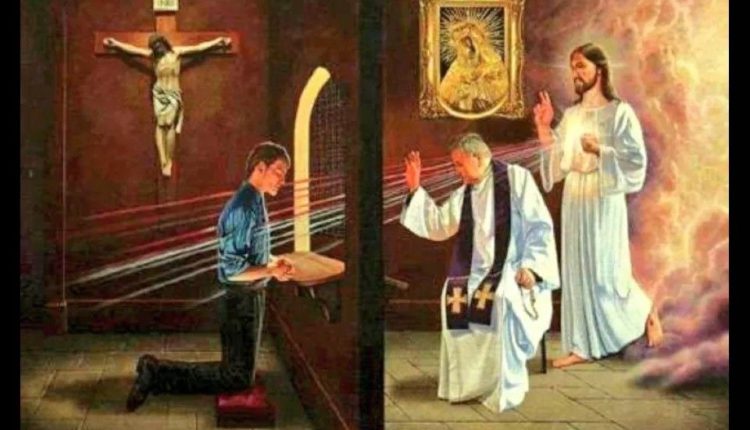Say to them, As I live, says the Lord God, I have no pleasure in the death of the wicked, but that the wicked turn from their ways and live; turn back, turn back from your evil ways; for why will you die, O house of Israel?’ (Ezek. 33:11)
The only way to escape from eternal death is to turn back from our evil ways and follow what God revealed through Jesus. This is elementary catechism and as Christians we know it. The first step in our journey through the path of justice is to turn back from sin and receive the grace in a good confession. The essential steps for a good confession are :
1.The Examination of conscience so as to recollect all the sins, especially mortal ones
2. Sincere repentance
3. The Decision not to sin again
4. Confessing the sins to the priest and
5. Doing the penance prescribed by the priest
Every confession is an opportunity to experience the boundless mercy of God. Every confessional is the place where God waits for the return of the prodigal son. It is relevant here to think why the father did not go to the pigsty to rescue his son from there? Do you think that it was beyond his means to go in search of the lost son and bring him back? If we expect the father to go after the son, we are focusing on God’s mercy only. When we preach about God’s love and mercy, we should never forget the truth that justice is also an equally important attribute of God’s character.
If the prodigal son was rescued without any effort on his part, he will never understand how great a blessing he received. Only when he realized the depths to which he fell, he started thinking about the father. As long as his physical needs were fulfilled, he did not care to think about his father. A decision to return to the father is the first step to a good confession. A person going for confession should do so with a sincere desire to return to the house of his Lord and his God that he once left.
This homecoming should not be to continue with the same old lifestyle. The possibilities of a meaningful confession open when we accept the advice Paul gave to the Ephesians: ‘ You were taught to put away your former way of life, your old self, corrupt and deluded by its lusts’ (Eph.4:22). A confession done with a decision to continue life in the old way is worthless and he or she should not expect grace to flow from the mere exercise of going through the form of a confession. As we know, when it comes to confession, matter is as important as form and the matter is incomplete without a truly contrite heart. ‘The sacrifice acceptable to God is a broken spirit; a broken and contrite heart, O God, you will not despise’ (Ps 51:17)
Why should we go to a priest for confession? Is it not sufficient to confess the sins directly to God? Earlier this question used to come from non-believers or non–catholics. If we see many Catholics asking the same question now, it is a direct indication of how weak our faith has become.
So we need to start from the basics. Who has the power to forgive sins? No doubt, Jesus Christ is the only person in the whole history of the world who stated that he has the power to forgive sins. He can forgive sins because he is the Son of God. Before healing the paralytic, Jesus forgave his sins. ‘When he saw their faith he said, “Man, your sins are forgiven you” (Lk 5:20). We should note the occasion selected by Jesus to publicly proclaim his power to forgive sins. It was in an assembly, where ‘Pharisees and teachers of the law were sitting nearby (they had come from every village of Galilee and Judea and from Jerusalem)’ (Lk 5:17) that Jesus made this revolutionary statement. Without any doubt, he knew that the Pharisees and Scribes who boasted of their knowledge in the Scripture and adherence to the law cannot accept what he was going to say.
We see Jesus explaining it in simple words for their benefit, ‘ ….. But so that you may know that the Son of Man has authority on earth to forgive sins………” (Luke 5:24). Doubts about Jesus’ authority to forgive sins increase with an increase in knowledge. Even today this is true. Ordinary believers have no doubt in it whereas some scholars, experts and theologians who pursue the knowledge of this world have failed to recognise the true meaning of the precious gift of confession.
Let us remember the words spoken by the angel who appeared to Joseph in dream. ” … You are to name him Jesus, for he will save his people from their sins”(Mt 1:21). It was the divine will of the heavenly Father to send his son to this world as a man, to save us from our sins. The letter to the Hebrews gives a beautiful narration about the purpose of Jesus’ incarnation. ‘Then I said, ‘See, God, I have come to do your will, O God’ (in the scroll of the book it is written of me)’ ( Heb 10:7). Once Jesus accomplished the eternal sacrifice he was seated at the right hand of the Father. Sin offerings of the old became irrelevant and redundant from that moment. ‘ Where there is forgiveness of these (sins), there is no longer any offering for sin’ ( Heb 10:18).
In the gospels we see Jesus delegating his authority to forgive sins to his disciples. ‘ When he had said this, he breathed on them and said to them, “Receive the Holy Spirit. If you forgive the sins of any, they are forgiven them; if you retain the sins of any, they are retained’ (Jn 20: 22-23). In other words the authority to forgive the sins of others is a special power given to those disciples who receive the anointing of the Holy Spirit. Before leaving this world, Jesus Christ delegated the power to forgive sins to his mystical body, the Church. Those disciples who were given this authority directly by the Lord passed it on to others as well by laying on of their hands. Priesthood and the authority to forgive sins which is its natural corollary are passed through generations by the laying on of hands. It is the duty of every anointed servant of God not only to retain it through a life of continuous prayer but also to rekindle the anointment. Listen how Paul reminds Timothy of the importance of doing it. ‘For this reason I remind you to rekindle the gift of God that is within you through the laying on of my hands’ ( 2 Tim 1:6)
Do you believe that we can also do the things done by Jesus? We may have doubts. But Jesus had no such doubts. He categorically states that any person who believes in him can also do the things done by him. “Very truly, I tell you, the one who believes in me will also do the works that I do and, in fact, will do greater works than these, because I am going to the Father” (Jn 14:12). When Jesus says ‘ the works that I do’, it includes the work of forgiving sins too. Every priest sitting at the confessional is believing in Jesus Christ who possesses the authority to forgive sins and who empowered them also with the same authority. What they exercise during confession is the power and anointing conveyed to them through an unbroken chain of laying on of hands that started with the Apostles.
To summarise, Jesus Christ is the only person having the power to forgive sins. He delegated this power to his disciples and the disciples in turn conveyed this power to their successors by laying on of their hands. The Church continues to exercise this authority through bishops and priests till today. Forgiving the sins is one of the major areas of the Church’s ministry. It is not because we think so, but because it flows from the command of our Lord, who entrusted this great ministry to the Church. “…. Repentance and forgiveness of sins is to be proclaimed in his name to all nations, beginning from Jerusalem” (Lk 24:47).
The purpose of writing these in detail is to bring home the importance of the sacrament of reconciliation or confession. Sadly, many among our fellow Christians fail to understand the value of confession and the need to have it regularly. Among them are laity, and unfortunately priests too.
When churches were closed due to Covid -19, a good number of people who were otherwise regular in going for confession could not do so. On the other side, there are thousands upon thousands who gradually slip into the practice of going to confession very rarely and in many cases once in a year just to fulfill the precept of the Church! And a generation is coming up who think that it is more easy and convenient to confess directly to God, sitting at the comfort of their homes, rather than going to a priest. Some may even think that like the Holy Mass, Confession also should be made online for their convenience. In spite of all these, there are thousands of priests in the Church who never deny the sacrament of confession to anybody approaching them.They are the living examples of how the Holy Spirit leads the Church even in these times of difficulties.
But what is of particular concern to us is that there are many who, though eager to have a confession that is already overdue, could not find a priest. It breaks their hearts when they see their parish priest or some other priest whom they used to approach for confession in the past refuses to hear their confession for fear of Covid -19. What Jesus wanted and what the Church teaches is that a priest should be a father waiting at the open door in anticipation of the son, who would come any moment. The concept of a priest or a Levite who passes by on the other side, ignoring the wounded person is totally alien to Christian faith, culture and tradition. They should ask themselves whether there would come a Samaritan after they leave. To put it in another way, Jesus is sending his priests to be good Samaritans to those who come to them with a wounded soul. The first and foremost duty of a priest should be to pour oil and wine on the spiritual wounds of sinners approaching them. We call this act the sacrament of Confession.
Church emphasises the importance of the sacrament of Confession and the duty of priests to celebrate it in these words: ‘Priests must encourage the faithful to come to the sacrament of Penance and must make themselves available to celebrate this sacrament each time Christians reasonably ask for it’ ( CCC 1464, Codex Iuris Canonici can. 986, Codex Canonum Ecclesiarum Orientalium can.735, Presbyterorum ordinis 13).
Unfortunately some of our priests shun this most important ministry entrusted to them fearing the pandemic. It has become the norm rather than an exception in many parts of the world. Certain other priests think that their responsibility ends by giving the faithful a general absolution after a general confession. We should understand that this is not the official teaching of the Church. Never in history has the Catholic Church allowed her priests to use the permission to grant general absolution as a substitute of personal confession on a regular basis. The Catechism of the Catholic Church discusses this issue in detail and without leaving any doubt as to its applicability.
‘In case of grave necessity recourse may be had to a communal celebration of reconciliation with general confession and general absolution. Grave necessity of this sort can arise when there is imminent danger of death without sufficient time for the priest or priests to hear each penitent’s confession. Grave necessity can also exist when, given the number of penitents, there are not enough confessors to hear individual confessions properly in a reasonable time, so that the penitents through no fault of their own would be deprived of sacramental grace or Holy Communion for a long time. In this case, for the absolution to be valid the faithful must have the intention of individually confessing their grave sins in the time required. The diocesan bishop is the judge of whether or not the conditions required for general absolution exist. A large gathering of the faithful on the occasion of major feasts or pilgrimages does not constitute a case of grave necessity'(CCC 1483).
The purpose of permitting priests to give general absolution is to ensure that the penitents should not be deprived of sacramental grace or Holy Communion for a long time, for no fault of theirs. This is an exception, the normal rule being personal confession. Even in cases when general absolution is given, the penitent should go for a regular confession at the earliest possible opportunity.
Priests who disregard such an important instruction and resort to the practice of frequent general absolution instead of personal confession are certainly doing it without understanding its seriousness. Confession is essential for the spiritual nourishment of the faithful. Exactly for this reason the Church makes it the duty of priests to hear the confession of the faithful. On the other hand, the second precept of the church – You shall confess your sins at least once a year – read with the third precept – You shall receive the sacrament of the Eucharist at least during the Easter season ( CCC 2042) – tells us the bare minimum that is expected of a Catholic. It is an annual confession and receiving the Holy Eucharist during the Easter season. We go to confession not to please the Church, but to console our soul. Not to enrich the Church, but to liquidate our debts. Saintly priests sit at the confessional for hours together not because they have nothing else to do, but because they consider every soul precious, and are determined that no person approaching them for a confession should be refused lest they go back with a heavy heart.
I would like to share the experience of a priest whom I approach for regular confession during the past one year. He is on the wrong side of seventy. The list of his ailments include cancer, diabetes and hypertension. He celebrates Holy Mass for us every day and does not have any issue with giving communion on the tongue. When I met him first in April 2020, he was waiting for the appointment of an Oncologist for the second stage of cancer treatment. But the lockdown and travel restrictions did not permit him to undertake the journey to the hospital. For the next eleven months or so he did not use any medicines. Finally, he could consult his doctor in February 2021 only and the doctor was surprised to see that there were no signs of cancer in his body. Forget about covid also. It didn’t come even near to him.
Any priest who considers his priestly ministry seriously and shows a fatherly interest in the spiritual affairs of the flock entrusted to him should have such experiences to share.They did not fear Corona virus that can kill the body. But they feared the one who could throw the body and soul into hell. That Almighty God, whom they feared, miraculously protected them. They will not fear the terror of the night, or the arrow that flies by day. Even while thousands fall at their side and ten thousand at their right hand, they are confident that no evil shall befall them. Let us remember with gratitude those saintly priests who, knowing that no scourge will come near their tent, makes themselves available to their flock and continue the ministry against all odds. Their one and only mission is to see that not even a single soul entrusted to them is lost. We should pray for such priests.
But there are some other priests who closed the doors of their churches for long intervals.They were afraid of Covid-19. When the churches opened and Holy Mass resumed,we saw them washing their hands with sanitiser before and after distributing the Holy Eucharist. We have seen this too, that some priests who made wearing a mask and maintaining social distancing their rule of life already contacted covid! What they feared most, chased and caught them. This is not to blame, but to direct them also to the ultimate remedy called the love of Jesus Christ. He will not forsake us. Borrowing the worlds of Paul, let us also pray for them; ‘I pray that you may have the power to comprehend, with all the saints, what is the breadth and length and height and depth, and to know the love of Christ that surpasses knowledge, so that you may be filled with all the fullness of God’ (Eph 3:18).
What makes us worthy to receive the Holy Eucharist is a good confession. This is why the Church teaches: ‘Anyone who is aware of having committed a mortal sin must not receive Holy Communion, even if he experiences deep contrition, without having first received sacramental absolution, unless he has a grave reason for receiving Communion and there is no possibility of going to confession (CCC 1457). Receiving communion without confession is an exception permitted by the Church to be exercised by a person who is in danger of imminent death and where there is no scope of getting a priest for confession.
Our Lord has told us to be ever vigilant in preparation for meeting him. Of all preparations we make during these days, the most important is a good confession. A confession done with true repentance followed by Holy Eucharist will give us the strength to ‘withstand on that evil day, and having done everything, to stand firm’ (Eph.6:13). We are writing these lines in the background of a growing tendency among Catholics to receive Holy Eucharist without a proper confession citing the excuse that no priests were available for confession. How can we approach the great gift of Holy Eucharist so casually? Understandably, many people do it without realizing the consequences of receiving Communion unworthily. For them Paul has written: ‘Whoever, therefore, eats the bread or drinks the cup of the Lord in an unworthy manner will be answerable for the body and blood of the Lord. Examine yourselves, and only then eat of the bread and drink of the cup. For all who eat and drink without discerning the body, eat and drink judgment against themselves. For this reason many of you are weak and ill, and some have died (1 Cori 11:27-30).
Why will you die, O Christan? Go to confession right now when it is available. Please do not delay it. Never say, tomorrow….tomorrow. Because that tomorrow might never come. A good confession is a matter of life, that too eternal. With this understanding go to your parish priest and humbly tell him of your desire to have a confession. Most of the priests will certainly open the doors of the confessional for you. Admittedly, there will be some priests who may refuse to hear a personal confession fearing the pandemic. In all humility ask them whether they have seen a priest die of Covid-19 infection solely because they administered the sacrament of confession or giving communion on the tongue.
We need to do something more. We should say the prayer of prophet Elisha. Yes, there is such a prayer, though you might not see it in prayer books. This short prayer was said by Elisha for his attendant Gehasi who was scared at the very sight of the army of enemies that surrounded them. He saw only the enemies. He could not see the protection God had prepared for them. Elisha prays: “O Lord, please open his eyes that he may see” (2 Kings 6:17). Let us pray for all priests so that they may see the protection guaranteed by God to all those who are faithful to Him.
If confession is not available in your parish, go to another church or monastery. The pain you take for it will never go in vain. We know a large number of persons who travelled for hours during the pandemic to get a confession. They realized the great value of confession. We should fear, by the time we realize the true value of confession and how indispensable it is, it will be too late and confessionals are closed forever. Things are moving in that direction.
My dear brothers and sisters in Christ, please walk now when enough light is still there. The night is fast approaching, a night when no one will be able to work.
Why will we die, O Christians? May the merciful Jesus Christ waiting at the confessional prepare us for the dark times ahead.
Click Here To Join Our Whatsapp Group
Click here To Join Our Telegram Channel

















